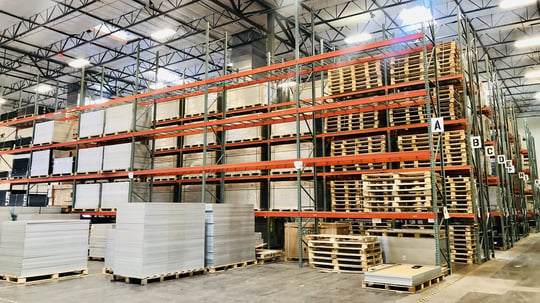This article (published 3/3/2021) features an interview with Janette Freeman, Business Development Manager at FabTech, a solar module refurbishing and recycling company. FabTech offers a buy-back program to large-scale solar operators for salvageable decommissioned panels, which helps offset the cost to recycle broken panels. FabTech has been a member of EnergyBin since 2017. Connect with Janette on EnergyBin to discuss how FabTech can assist with your decommissioning projects or any solar module disposal solutions.
Five years ago, Bob Lawrence, owner of FabTech Enterprises, took a risk. He revamped his company, transitioning from an IT reseller to a solutions provider for solar panel recycling and refurbishing. The move was truly entrepreneurial.
“Bob saw the opportunity. Armored with his drive, entrepreneurial skills, and relationships, he had the courage to take action, invest, and move forward,” states Janette Freeman, Business Development Manager at FabTech and Bob’s sister-in-law.
From IT to solar - A new beginning
Why did FabTech exit the information technology sector after more than fifteen years of industry experience? It wasn’t an issue of survival. Business was trucking along as normal.
“Actually, FabTech fell into solar by accident when customers started showing up with PV modules they no longer needed,” explains Janette. “Bob recognized the resale value potential, and after doing some market research, decided to go all in.”
 One of the first marketing decisions he made was to join EnergyBin. He recognized the networking value that EnergyBin had to offer as an online community comprised of PV professionals and a powerhouse of market intelligence. Bob was instantly able to make new connections and monitor solar equipment supply and demand with ease, which gave him insider knowledge as a new entrant.
One of the first marketing decisions he made was to join EnergyBin. He recognized the networking value that EnergyBin had to offer as an online community comprised of PV professionals and a powerhouse of market intelligence. Bob was instantly able to make new connections and monitor solar equipment supply and demand with ease, which gave him insider knowledge as a new entrant.
Today, that decision made five years ago is proving to be just what Bob envisioned. In 2019, FabTech’s facilities in Arizona and Ohio refurbished 95,000 modules and resold nearly 202,000 modules in the solar secondary market, which amounts to seven megawatts of salvaged equipment.
In 2020, the number of refurbished modules jumped to 150,000. Business is so good that FabTech is gearing up to open a third facility in Georgia. The East Coast location will be a major center for exporting used panels as well as collecting and processing decommissioned modules.
A vision worth pursuing
Janette joined the team in March of 2020. She came with a background in business development, marketing, and coaching/personal development training. In conversations with her sister and brother-in-law, she was awestruck by their solar vision. When they asked her if she would like to head up the recycling and refurbishing division, she was quick to sign on.
 “I feel like we are just beginning to see the wave form, but we have much to do to reach its peak. There is a huge need for the future. I’m excited to be a part of laying the groundwork so that FabTech will be a major player in the decommissioning arena and a respectable name as a solutions provider for end-of-life management.”
“I feel like we are just beginning to see the wave form, but we have much to do to reach its peak. There is a huge need for the future. I’m excited to be a part of laying the groundwork so that FabTech will be a major player in the decommissioning arena and a respectable name as a solutions provider for end-of-life management.”
FabTech offers a one-stop shop for used modules. The company processes panels from all major brands, including Mission Solar, SunPower, Jinko, Trina, Yingli, Canadian Solar, Suntech, VSUN, and REC. The first step is to assess the inventory. If any part of the lot is salvageable, then FabTech offers a payment to the customer.
The payment for reusable panels offsets the cost to recycle those that are unsalvageable, which are any modules with shattered glass. The recycling cost can be prohibitive because the processing cost outweighs the value of recycled glass and aluminum. Freight is the largest line item expense in the recycling process.
“Our buy-back program makes recycling more attractive [to solar owners] because we help them cover some of their costs, and it helps us to be able to provide solar panel supply to the secondary market. Secondary market consumers benefit from more options at lower prices. Many of these buyers couldn’t otherwise afford solar systems.”
Once decommissioned modules arrive at a FabTech facility, they await processing in a 10-acre yard. They are sorted for broken glass and possible refurbishing. Panels with broken glass are bound for recycling, and they move through that process. The non-broken panels are moved to the warehouse, where they are sorted, inspected, repaired, and cleaned. Then, they are taken to the shipping department, where they are packed for resale.
Keeping solar modules out of landfills
On average, FabTech is able to salvage 65% of annual volume for resale. These panels are less than 10 years old and have a minimum efficiency rate of 80%.
Who is buying second-hand modules, you may ask?
In FabTech’s experience, the customer base in the secondary market is completely different than that of the primary solar market. They are individual do-it-yourselfers, RV owners, off-grid homeowners, small to mid-sized installers serving price-conscious consumers, and international buyers seeking highly discounted prices.
“Even though there is an expectation in the industry that the price may decrease for brand new panels, it will still not compete with the price of used panels. The price per value of our used panels is really attractive. A low price may be 25% of new, but the functionality is still 80% of new.”
 FabTech’s goal is to keep modules out of landfills and re-use undamaged equipment if at all possible. Janette urges utilities, O&Ms, and developers to take responsibility for proper disposal. At decommissioning and repowering sites, many of the panels are not damaged and hold value.
FabTech’s goal is to keep modules out of landfills and re-use undamaged equipment if at all possible. Janette urges utilities, O&Ms, and developers to take responsibility for proper disposal. At decommissioning and repowering sites, many of the panels are not damaged and hold value.
“We’ve had several customers end up with $40,000 to $100,000 or more for those panels. For the renewable industry to grow right and make a difference in decreasing the carbon footprint, we all need to take personal responsibility when it comes to sustainability.”
Moving toward a circular economy
The solar industry has been criticized for failing to establish a circular economy. Skeptics particularly note a lack of end-of-life management practices. They fear anticipated waste will be counter-productive to the solar industry’s promise to provide a clean energy source.
In conversations with recycling and materials processors, Janette has learned that solar panel recycling is at the forefront of their minds. She has also worked with many solar companies - major industry players – who are taking personal responsibility. They nurture a corporate culture that supports recycling. Plus, they allocate a portion of their budgets to end-of-life management.
Still, more needs to be done to prepare for a globally streamlined process. Janette believes necessity is the mother of invention.
“I think that this big problem is going to cause a lot of innovation. It already is. When there is a need, there are solutions and monetary advantages to finding those solutions. That’s what drives economic growth. I’m not diminished by the problem; I’m encouraged by it.”
A special thanks...
 To Janette Freeman for sharing how FabTech provides innovative solutions for solar panel recycling and refurbishing.
To Janette Freeman for sharing how FabTech provides innovative solutions for solar panel recycling and refurbishing.
.jpg)
 The Ultimate Guide to Selling Wholesale Solar Equipment
The Ultimate Guide to Selling Wholesale Solar Equipment